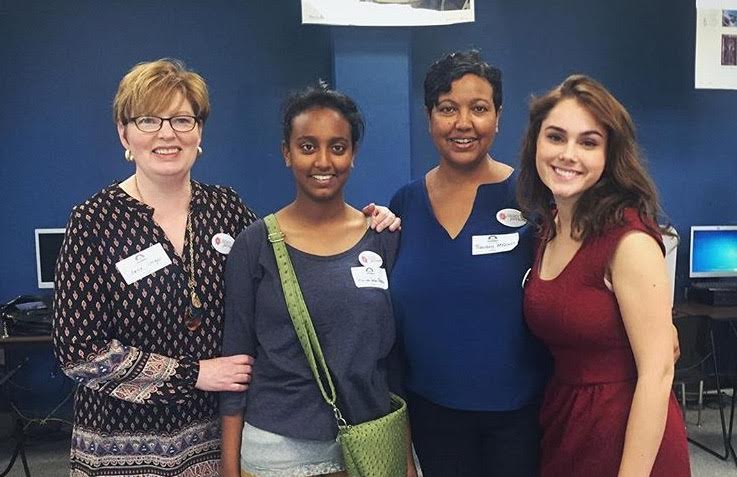Dropping out of school because you got your period is unfathomable for girls in the United States, yet for thousands of Ethiopians menstruation is an education deal breaker.
On April 28 Feminist Club welcomed Mariam Seba Sanitary Products Factory owner Freweini Mabrahtu to talk about Dignity Period, a non-profit organization. This organization provides sanitary products to women in Ethiopia because menstruation is a taboo subject that prevents young girls from attending school when they do not have adequate supplies.
“I shared a bed with my older sister when I had my first period. I know she saw it, but she didn’t say a word! I felt confused and alone. I had to figure everything out on my own,” Mebrahtu said.
“Half of the world’s population has, has had, or will have a period, we need to break the taboo and start having these crucial conversations. It is important that we stop viewing menstruation as anything other than a natural, healthy part of life, and instead encourage women of all ages that nothing can hold them back,” senior Mariel McMindes, founder of Operation Keep Girls in School said.
For every $4 donated, Dignity Period supplies one girl with washable hygiene products for 12-18 months. The supplies are created by 42 women 18 and older in a factory located in Mekelle, Ethiopia. Each year the factory produces 600,000 pads for girls in both Ethiopia and East Africa. Â
Mebrahtu moved to the United States as a young women and became a strong, influential businesswoman. After returning to Ethiopia she saw that the girls were dealing with feelings of fear and shame just as she experienced as a child. Determined to make a change, Mebrahtu founded the Mariam Seba Sanitary Products Factory in 2009 and partnered with Dignity Period.
“As far as the feminist club, we are going to start working with Dignity Period and Freweini Mebrathu as soon as possible,” senior Poonita Sheevam, co-president of feminist club, said. “We hope to raise awareness locally and help our peers realize that the world outside of West County still has simple social issues like the menstrual cycle.”


![Gazing up from the stage, junior Joseph McCurdy who played Peter Pan in the school play, Lost Girl, sits next to senior Juliana Rogers, who plays Wendy Darling, during a theater rehearsal. McCurdy’s passion for theater began when he observed a West High production in middle school. “I've been in the high school theater program since I was a freshman. I've always loved theater, but [what prompted me to join] was [when] I went to see [a performance here] when I was in middle school, and it was super cool,” McCurdy said.](https://pwestpathfinder.com/wp-content/uploads/2025/11/IMG_6535-1200x798.jpeg)

![Standing tall, stacked in a precise formation, the cheer team strikes a signature pose during halftime on Sept. 12 at the varsity football game. Nearly a month after this performance, the cheer team performed at the Missouri Cheerleading Coaches Association (MCCA) regional competition on Oct. 4, 2025. “We've all come [to] work together a lot more,” sophomore Elyssa Philippi said. “We're a lot closer than we were [earlier in the season] and going to state has made us closer [in] trying to work with each other, learn [new] skills and make our team better.”](https://pwestpathfinder.com/wp-content/uploads/2025/11/DSC5139-1.jpg)
![Handing out candy to excited trunk-or-treaters, President of the United Nations Children’s Fund club and junior Sara Ashok represents that group. Ashok was eager to participate in this event for multiple reasons. “I really wanted to be a part of the event because I get to help create memories for kids and spend time with my friends, spreading the things [I'm passionate about],” Ashok said.](https://pwestpathfinder.com/wp-content/uploads/2025/11/DSC_8648-1-1200x800.jpg)

![Smiling in a sea of Longhorns, Fox 2 reporter Ty Hawkins joins junior Darren Young during the morning Oct. 3 pep rally. The last time West was featured in this segment was 2011. “[I hope people see this and think] if you come to [Parkway] West, you will have the time of your life because there are so many fun activities to do that make it feel like you belong here. I was surprised so many people attended, but it was a lot of fun,” Young said.](https://pwestpathfinder.com/wp-content/uploads/2025/10/Edited2-1200x798.jpg)
![West High seniors and families listen as a representative of The Scholarship Foundation of St. Louis, Teresa Steinkamp, leads a Free Application for Federal Student Aid (FAFSA) workshop. This session, held in the library, provided guidance on financial aid, scholarships and student loan options. “This event is very beneficial for any seniors who are applying to or considering applying to colleges after high school [because] the cost of college is on the rise for seniors and parents,” college and career counselor Chris Lorenz said.](https://pwestpathfinder.com/wp-content/uploads/2025/09/DSC_4478-1200x778.jpg)
![Senior Kamori Berry walks across the field during halftime at the Homecoming football game on Sept. 12. During the pep assembly earlier that day, she was pronounced Homecoming Queen. “I thought it was nice that the crowd [started] cheering right away. I know [my friends] were really excited for me, and my family was happy because typically non-white people don't win,” Berry said.](https://pwestpathfinder.com/wp-content/uploads/2025/09/DSC7046-Enhanced-NR-1200x798.jpg)

